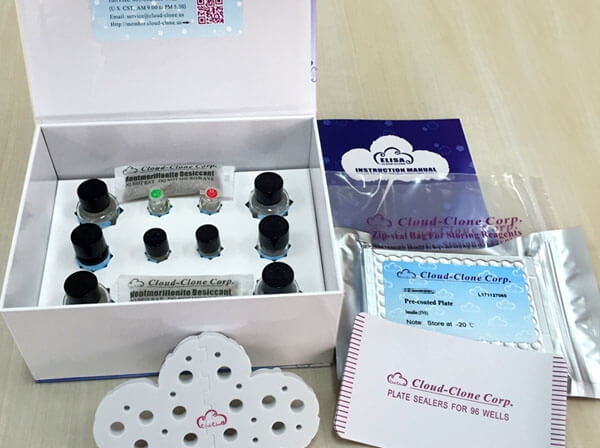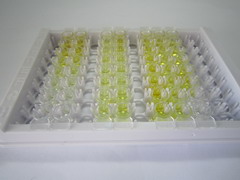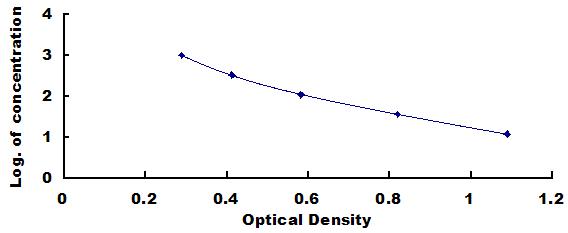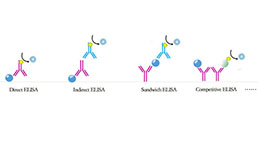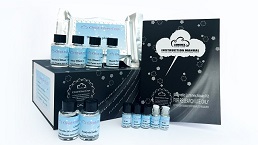ELISA Kit for Adenosine Triphosphate (ATP) 

Adenosine-5'-Triphosphate
- UOM
- FOB US$ 557.00 US$ 796.00 US$ 3,580.00 US$ 6,763.00 US$ 55,692.00
- Quantity
Overview
Properties
- Product No.CEA349Ge
- Organism SpeciesPan-species (General) Same name, Different species.
- ApplicationsEnzyme-linked immunosorbent assay for Antigen Detection.
Research use only - DownloadInstruction Manual
- Category
Sign into your account
Share a new citation as an author
Upload your experimental result
Review

Contact us
Please fill in the blank.
Recovery
Matrices listed below were spiked with certain level of Adenosine Triphosphate (ATP) and the recovery rates were calculated by comparing the measured value to the expected amount of Adenosine Triphosphate (ATP) in samples.
| Matrix | Recovery range (%) | Average(%) |
| serum(n=5) | 87-95 | 91 |
| EDTA plasma(n=5) | 89-101 | 96 |
| heparin plasma(n=5) | 97-104 | 101 |
Precision
Intra-assay Precision (Precision within an assay): 3 samples with low, middle and high level Adenosine Triphosphate (ATP) were tested 20 times on one plate, respectively.
Inter-assay Precision (Precision between assays): 3 samples with low, middle and high level Adenosine Triphosphate (ATP) were tested on 3 different plates, 8 replicates in each plate.
CV(%) = SD/meanX100
Intra-Assay: CV<10%
Inter-Assay: CV<12%
Linearity
The linearity of the kit was assayed by testing samples spiked with appropriate concentration of Adenosine Triphosphate (ATP) and their serial dilutions. The results were demonstrated by the percentage of calculated concentration to the expected.
| Sample | 1:2 | 1:4 | 1:8 | 1:16 |
| serum(n=5) | 84-101% | 87-102% | 87-95% | 88-102% |
| EDTA plasma(n=5) | 85-103% | 80-90% | 96-104% | 78-101% |
| heparin plasma(n=5) | 98-105% | 90-103% | 80-94% | 78-94% |
Stability
The stability of kit is determined by the loss rate of activity. The loss rate of this kit is less than 5% within the expiration date under appropriate storage condition.
To minimize extra influence on the performance, operation procedures and lab conditions, especially room temperature, air humidity, incubator temperature should be strictly controlled. It is also strongly suggested that the whole assay is performed by the same operator from the beginning to the end.
Reagents and materials provided
| Reagents | Quantity | Reagents | Quantity |
| Pre-coated, ready to use 96-well strip plate | 1 | Plate sealer for 96 wells | 4 |
| Standard | 2 | Standard Diluent | 1×20mL |
| Detection Reagent A | 1×120µL | Assay Diluent A | 1×12mL |
| Detection Reagent B | 1×120µL | Assay Diluent B | 1×12mL |
| TMB Substrate | 1×9mL | Stop Solution | 1×6mL |
| Wash Buffer (30 × concentrate) | 1×20mL | Instruction manual | 1 |
Assay procedure summary
1. Prepare all reagents, samples and standards;
2. Add 50µL standard or sample to each well.
And then add 50µL prepared Detection Reagent A immediately.
Shake and mix. Incubate 1 hour at 37°C;
3. Aspirate and wash 3 times;
4. Add 100µL prepared Detection Reagent B. Incubate 30 minutes at 37°C;
5. Aspirate and wash 5 times;
6. Add 90µL Substrate Solution. Incubate 10-20 minutes at 37°C;
7. Add 50µL Stop Solution. Read at 450 nm immediately.

Test principle
This assay employs the competitive inhibition enzyme immunoassay technique. An antibody specific to ATP has been pre-coated onto a microplate. A competitive inhibition reaction is launched between biotin labeled ATP and unlabeled ATP (Standards or samples) with the pre-coated antibody specific to ATP. After incubation the unbound conjugate is washed off. Next, avidin conjugated to Horseradish Peroxidase (HRP) is added to each microplate well and incubated. The amount of bound HRP conjugate is reverse proportional to the concentration of ATP in the sample. After addition of the substrate solution, the intensity of color developed is reverse proportional to the concentration of ATP in the sample.
Giveaways
Increment services
Citations
- Effects of Aerobic Training, with or without Zizyphus Jujuba Water Extraction, on Fundus Nesfatin-1, ATP, HDL-C, and LDL-C Concentrations in Female RatsIjvst: Source
- Neuroprotective effects of vildagliptin in rat rotenone Parkinson's disease model: role of RAGE‐NFκB and Nrf2‐antioxidant signaling pathwaysPubMed: 25752913
- Metabolic Features of Heart Failure with Different Etiology ofsp11075
- Rifampicin-induced injury in L02 cells is alleviated by 4-PBA via inhibition of the PERK-ATF4-CHOP pathway.pubmed:27470132
- Rifampicin-induced injury in HepG2 cells is alleviated by TUDCA via increasing bile acid transporters expression and enhancing the Nrf2-mediated adaptive response.pubmed:28688954
- Chemiluminescent bioanalytical assays for clinical biomarkers2445/116053
- The Antioxidative Action of ZTP by Increasing Nrf2/ARE Signal Pathway
- Antihypoxic and anti-ischemic properties of the North Caucasus flora plant extracts
- Effects of nanoparticles on Neuroinflammation in a Mouse Model of AsthmaPubmed: 31542455
- Novel complex of cosmetic ingredients with promising action in preventing hair loss and follicular aging through mechanism involving enrichment of WNT/signaling …Pubmed: 33179848
- Ethylmethylhydroxypyridine succinate, acetylcysteine and choline alphoscerate improve mitochondrial function under condition of cerebral ischemia in rat
- Prostaglandin E receptor subtype 4 protects against diabetic cardiomyopathy by modulating cardiac fatty acid metabolism via FOXO1/CD36 signalling33647796
- Serum Metabolomic Analysis of Coronary Heart Disease Patients with Stable Angina Pectoris Subtyped by Traditional Chinese Medicine Diagnostics Reveals ¡
- Estrogen inhibits bladder overactivity in rats with cyclophosphamide‐induced cystitis via downregulating the expression of P2X3 receptors in bladder epithelium cells34622458
- A Famous Chinese Medicine Formula: Yinhuo Decoction Antagonizes the Damage of Corticosterone to PC12 Cells and Improves Depression by Regulating …Pubmed:35281603




